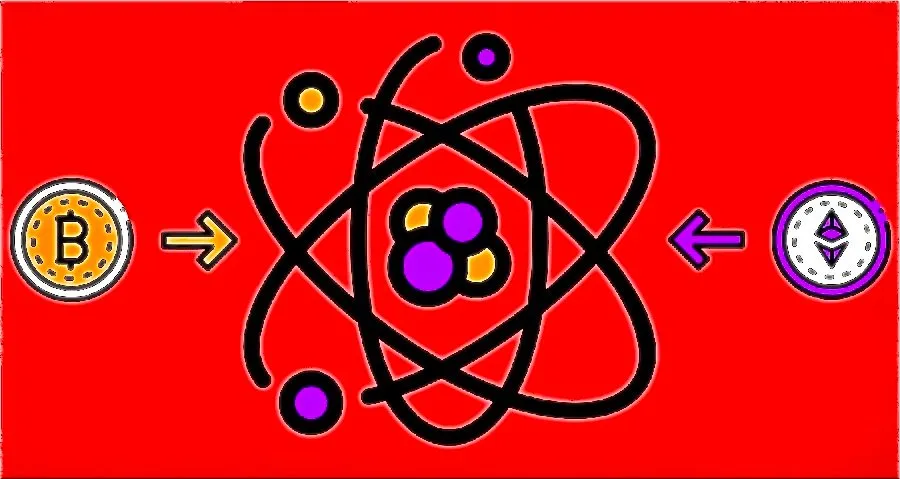Blocknet product allows atomic swaps
Blocknet recently had it’s sixth birthday and they have created a product for use on decentralized exchanges, which implements the popular and previously theoretical concept of atomic swaps, for trading cryptocurrencies which are native to different blockchains, called a cross-chain or cross blockchain trade. The importance of this is to protect traders from one of the big security issues underlying the current method of enabling cross-chain trading on most popular decentralized exchanges like Uniswap which is called wrapping or more precisely Tokenization, because that process breaks a fundamental law in cryptocurrency: not your keys, not your crypto.
I think that opening statement contains a lot of information to unwrap. So I will break it into it’s component parts in this post.
First part: Not your keys, not your crypto
This is a basic law of cryptocurrency, that you keep your crypto, in your wallet, and it’s safe there because only you have the keys.
For example, the most common way people break thus first law of crypto is sending money to an exchange. You haven’t sold or given away your crypto, you still own it, but you transfer it from your wallet, where it’s protected by your keys, to a wallet on the exchange, which now contains your crypto, but it’s controlled by the exchanges keys. The exchange is set up so that you don’t feel this loss of control until the exchange decides to deny you access to your crypto and there’s nothing you can do about it because the exchange possesses the keys to the wallet where your crypto is stored. That’s why you hear the phrase: not your keys, not your crypto.
For Example:
Exchanges can freeze trading and transactions to and from these wallets, indefinitely and effectively denying you access to your cryptocurrency. Exchanges can choose to keep any airdrops you would normally receive for investing in token projects and if it’s a staking project, which pays you rewards they can choose to keep those rewards also.
Let that sink in for a moment. This is not to scare you, but to equip you with facts and understanding.
Second part DeFi frequently require you to break the law of; “Not Your Keys, Not Your Crypto”.
Trading cryptocurrency on a decentralized exchange frequently requires you conduct or perform a cross-blockchain trade, which means exchange two crypto tokens from different blockchains. This trading is performed on a decentralized exchange platform like Uniswap, which is based on a popular blockchain with smart contract capability like Ethereum.
Normally one of the tokens you are going to trade is a “native” token, meaning it was made on that blockchain. An example is Ether, which is the native token of the Ethereum blockchain. The second token you wish to trade is usually a “non-native token, meaning it was made on a different blockchain. An example could be Bitcoin, which is made on the Bitcoin blockchain.
For example if you wanted to trade Bitcoin for Ethereum on a decentralized exchange like Uniswap, which is based on Ethereum, you can’t send Bitcoin to the decentralized exchange platform on Ethereum. You have to first send your Bitcoin to a platform which tokenized or wraps it. These words wrap it or tokenize mean swap your Bitcoin for a special crypto token called an ERC20 which represents the value of your Bitcoin token. Now this token representation of your Bitcoin can be sent to the trading platform called Uniswap, which is based on the Ethereum Blockchain.
This token is a special type of Ethereum blockchain native token that doesn’t represent the value on an Ethereum token, it represents the value of a non-native or off chain token. So in our example it would represent the value of one Bitcoin on the Ethereum blockchain. It is commonly called a wrapped token and in our example it would be called wrapped Bitcoin.
So as you can see, you are trading your Bitcoin token for an ERC20 token called wrapped Bitcoin. So although you still own the Bitcoin, it is transferred out of your wallet into someone else’s wallet which is controlled by their keys. So in order to trade on the decentralized exchange you have broken the first law of cryptocurrency; not your keys, not your cryptocurrency. You give the tokenizer your Bitcoin, and it leaves your wallet. Your Bitcoin goes into a special wallet controlled by the tokenizer and controlled by their keys.
You now have to trust someone else to keep your Bitcoin safe, until you bring back the wrapped Bitcoin and trade it for your real Bitcoin.
This is a big security risk for decentralized exchanges.
As you can see, you have broken the first law of cryptocurrency. Your Bitcoin left your wallet and is now in someone else’s wallet. They control your Bitcoin. If someone steals their keys, and then steals your Bitcoin, they now own your Bitcoin. And you have lost your investment with no legal option to recover it, other then sue a tokenizer who may now be broke, and unable to pay you. The tokenizer goes out of business and your story ends here.
Or worse the tokenizer disappears with your Bitcoin, and you have the same result.
In the case of a Tokenizer or Wrapper, you probably should ask where do they store your swapped bitcoin? How do they protect it? Is it a hot wallet? A cold wallet? Is the wallet offline or online? Thus is the beauty and complexity of cryptocurrency. It’s transparent if you understand.
Security Problem solved by Blocknet.io and atomic swaps instead of Tokenization or wrapping.
Atomic swaps are when your cryptocurrency stays in your wallet, you navigate on the internet to a platform that allows atomic swaps and then link your wallet. You perform person to person trading and your cryptocurrency doesn’t leave your wallet until you authorize the trade. You trade directly from your wallet to the counter party with no intermediary or middleman. You never break the first law of cryptocurrency.
Blocknet.io currently offers a dAPP or application called Block DX, which allows you to perform cross-blockchain token trades without the need to transfer your crypto to another person’s wallet for the Tokenization or wrapping of your assets. Your crypto stays in your wallet, under the control of your keys. You stay in complete and total control of your cryptocurrency all times. This is how atomic swaps on Block DX solve the security risk of crypto swapping at decentralized exchanges. Your crypto, your keys.
Done.
Block DX Exchange
Block DX is a truly decentralized cross-chain exchange built on the Blocknet Protocol. The project started in 2014 and was designed to be fully decentralized and peer-to-peer. #No-signups. #No-KYC. #No-middlemen.
This is atomic swaps and the future of cryptocurrency.
Please read my next post about a closely related and exciting topic Here #Thanks


